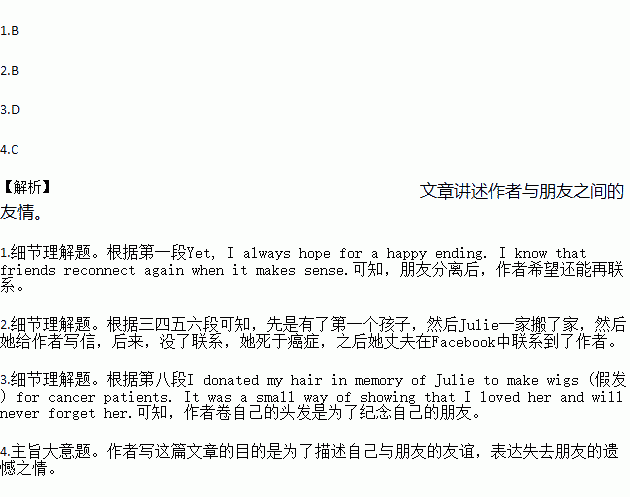题目内容
I know that there are times when friends are apart for a while – or even forever – and that your lives take different paths. Yet, I always hope for a happy ending. I know that friends reconnect again when it makes sense.
My friend Julie and I had a long period in our friendship. We used to see each other daily. I would eat brown rice in her kitchen while we shared our secrets.
Later, we celebrated each other’s weddings. My husband and I welcomed Julie’s first son (born on my birthday). By the time he was learning to walk, Julie and her family had moved to another city. We spoke on the phone sometimes and exchanged Christmas cards.
After they welcomed their third son, they moved to Edmonton, which is a farther city. We haven’t seen each other since then. They changed their phone numbers. I received a letter from her, but I couldn’t find that envelope later. I e-mailed her a few times, but didn’t get a reply.
It was painful not to be in touch with an old friend. I let it go. I knew that Julie and I would reconnect again, when it made sense.
Last year, Julie’s husband got in touch with me on Facebook. I felt something bad, and soon my feeling proved true: Julie had passed away the month before. She died of cancer.
I regretted that I had not been part of Julie’s support system, or the last years of her joyous, painful time on Earth. I cried. I’m so sorry, Julie, for counting on more chances.
Last week, I donated my hair in memory of Julie to make wigs (假发) for cancer patients. It was a small way of showing that I loved her and will never forget her. And that I look forward to us reconnecting again – when it makes sense.
1.When apart from her friends, the writer hopes ______.
A. they will be on the same path B. they can still be together some day
C. their friendship will end soon D. they’ll make other better friends
2.______ puts the following events in the correct time order.
a. Julie’s family moved to Edmonton.
b. Julie’s husband found the writer on Facebook.
c. Julie had her first son.
d. Julie died of cancer.
e. Julie wrote the author a letter.
A. c-e-a-b-d B. c-a-e-d-b
C. a-c-e-b-d D. a-e-c-d-b
3.The author donated her hair in order to ______.
A. make wigs for her friend B. forget the painful past
C. reconnect with her friend D. keep her friend deep in mind
4.The author wrote the article to ______.
A. encourage those who suffer cancer to live bravely
B. recall the good time shared with a good friend
C. express her regret of losing a good friend
D. call for more care about those who suffer cancer
 开心快乐假期作业暑假作业西安出版社系列答案
开心快乐假期作业暑假作业西安出版社系列答案

 d or use words due to brain damage are called aphasics(失语症患者).Such patients can be extremely good at something else.From the changing expressions on speakers' faces and the tones of their voices,they can tell lies from truths.
d or use words due to brain damage are called aphasics(失语症患者).Such patients can be extremely good at something else.From the changing expressions on speakers' faces and the tones of their voices,they can tell lies from truths.